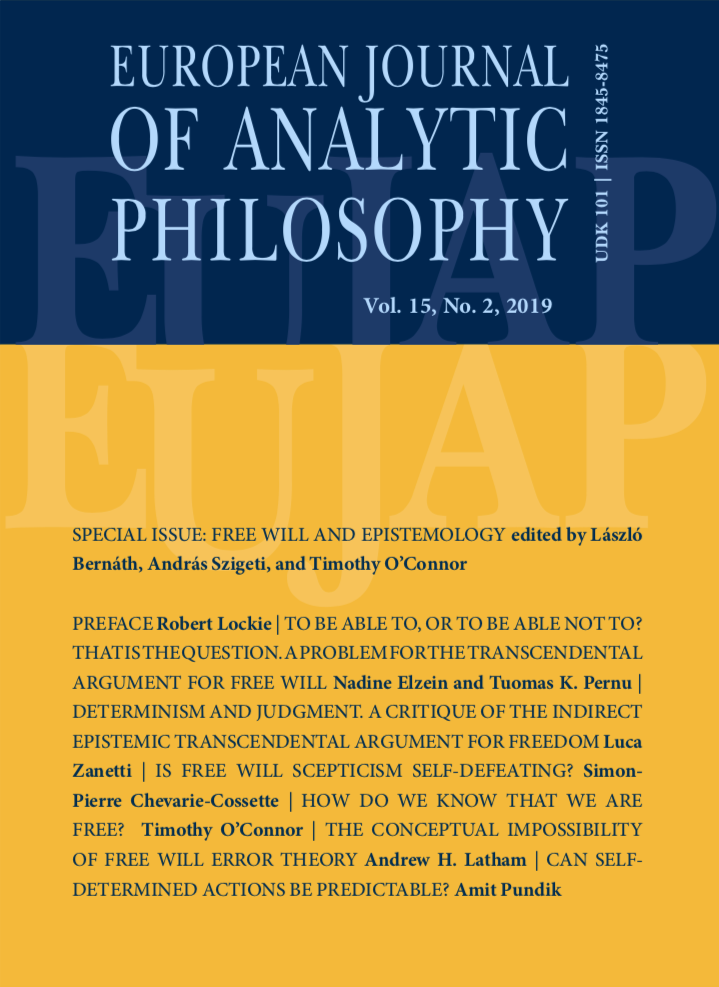View the whole issue here
- The Logical Contingency of Identity
Hanoch Ben-YamiPages: 5-10 | Abstract | 10.31820/ejap.14.2.1
I show that intuitive and logical considerations do not justify introducing Leibniz’s Law of the Indiscernibility of Identicals in more than a limited form, as applying to atomic formulas. Once this is accepted, it follows that Leibniz’s Law generalises to all formulas of the first-order Predicate Calculus but not to modal formulas. Among other things, identity turns out to be logically contingent. - Is Hobbes Really an Antirealist about Accidents?
Sahar Joakim and C. P. RaglandPages: 11-25 | Abstract | 10.31820/ejap.14.2.2
In Metaphysical Themes, Robert Pasnau interprets Thomas Hobbes as an anti-realist about all accidents in general. In opposition to Pasnau, we argue that Hobbes is a realist about some accidents (e.g., motion and magnitude). Section One presents Pasnau’s position on Hobbes; namely, that Hobbes is an unqualified anti-realist of the eliminativist sort. Section Two offers reasons to reject Pasnau’s interpretation. Hobbes explains that magnitude is mind-independent, and he offers an account of perception in terms of motion (understood as a mind-independent feature of body). Therefore, it seems incorrect to call Hobbes an anti-realist about all accidents. Section Three considers Pasnau’s hypothetical response: he might claim that for Hobbes, motion reduces to body and does not exist in its own right. Section Four notes that reductionism about all accidents does not entail anti-realism about all accidents. Even granting Pasnau’s anticipated response, his anti-realist reading does not follow. Contra Pasnau, Hobbes is best understood as claiming that motion and magnitude exist mind-independently. - Is Incompatibilism Compatible with Fregeanism?
Nils KürbisPages: 26-46 | Abstract | 10.31820/ejap.14.2.3
This paper considers whether incompatibilism, the view that negation is to be explained in terms of a primitive notion of incompatibility, and Fregeanism, the view that arithmetical truths are analytic according to Frege’s definition of that term in §3 of Foundations of Arithmetic, can both be upheld simultaneously. Both views are attractive on their own right, in particular for a certain empiricist mind-set. They promise to account for two philosophical puzzling phenomena: the problem of negative truth and the problem of epistemic access to numbers. For an incompatibilist, proofs of numerical non-identities must appeal to primitive incompatibilities. I argue that no analytic primitive incompatibilities are forthcoming. Hence incompatibilists cannot be Fregeans. - Book Review: Davor Pećnjak and Tomislav Janović, Towards Dualism: Essays in Philosophy of Mind, Ibis grafika: Zagreb, 2016
Luca MalatestiPages: 47-52 | Abstract
BOOK REVIEW, Davor Pećnjak, Tomislav Janović, PREMA DUALIZMU. OGLEDI IZ FILOZOFIJE UMA (Towards Dualism: Essays in Philosophy of Mind) Ibis grafika: Zagreb, 2016

